
Exclusive: Papadopoulos Met Numerous Times with Greek Leader with Substantial Ties to the Kremlin’s 2016 US Interference Campaign…
Throughout 2016, Trump adviser George Papadopoulos met with Greek Defense Minister Panos Kammenos multiple times, a man with connections to Russia’s Foreign Intelligence Service (SVR) and Vladimir Putin himself.
On all of these occasions, Papadopoulos represented himself as a current adviser to Donald Trump. He first met the Defense Minister in the early Spring according to the Greek newspaper Kathimerini. He had at least one other meeting with Kammenos in the Spring/Summer of 2016. In stunning detail unreported by US media, the Greek publication states that Papadapoulos was let go from the campaign and then re-hired in Early November, under a directive to only speak to the media about Hillary Clinton’s emails. Papadapoulos also requested a one-on-one meeting with the Prime Minister of Greece. The passage is below with a translation provided to me by a native Greek speaker.
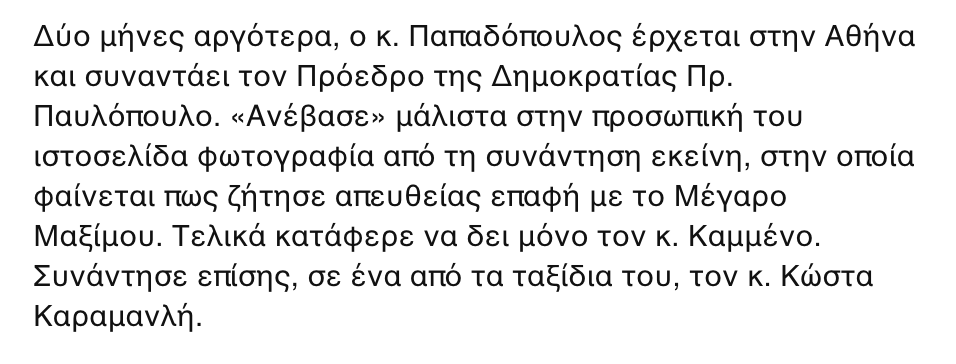
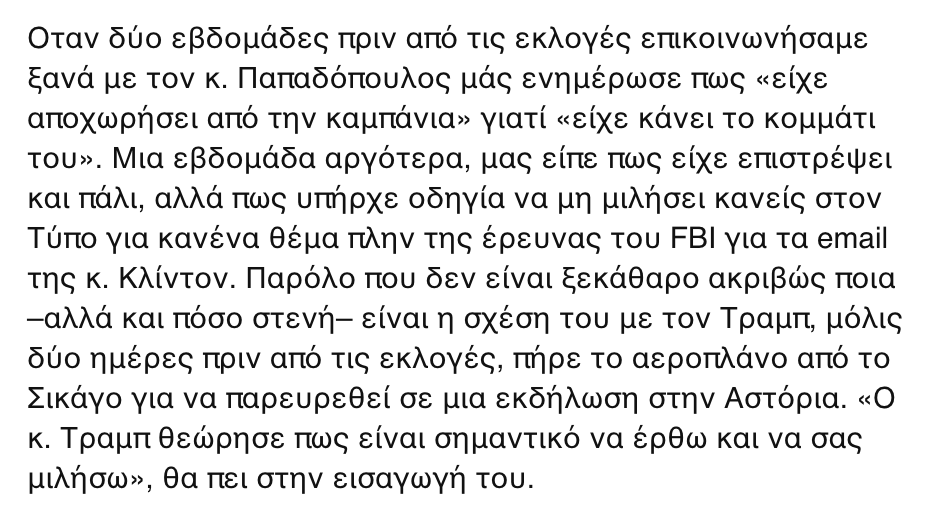
This brings up more questions than answers. Why was Papadapoulos originally let go and why did the Trump campaign find it so essential to spread dirt on Hillary Clinton that they brought him back a week later? Who ordered this directive? Who ordered Papadapoulos to fly to New York to speak to the Greek community about Hillary Clinton’s emails as an official member of the Trump campaign two days before the election? Why was this so important to the them? Papadopoulos strongly indicated that Mr. Trump himself wanted him to speak to the Greek group in Astoria, further eroding Mr. Trump’s claim that “few people knew” him. It appears that Mr. Trump knew him on November 6, 2016 as an important, high-level adviser.
Defense Minister Kammenos saw Papadopoulos as a crucial partner as well, as evidenced by his tweet on November 9 congratulating Trump on his win:
Συγχαρητήρια στον νέο πρόεδρο Τραμπ σημαντική η θέση πλέον του Ελληνοαμερικανού Γιώργου Παπαδόπουλου για την Ελλάδα pic.twitter.com/tYDkSqPH7t
— Panos Kammenos (@PanosKammenos) November 9, 2016
In December, he met with Kammenos on two separate occasions:
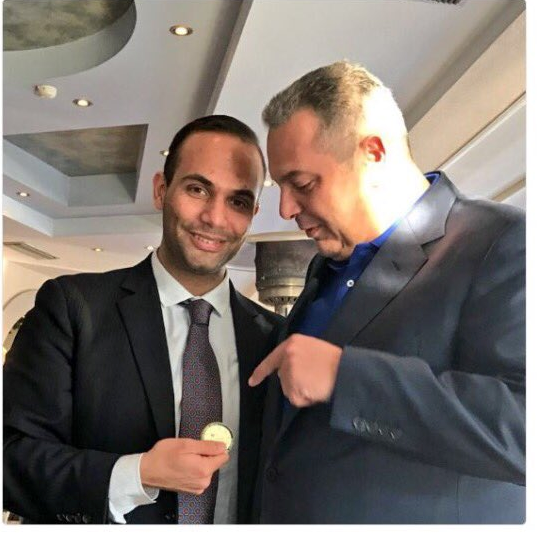
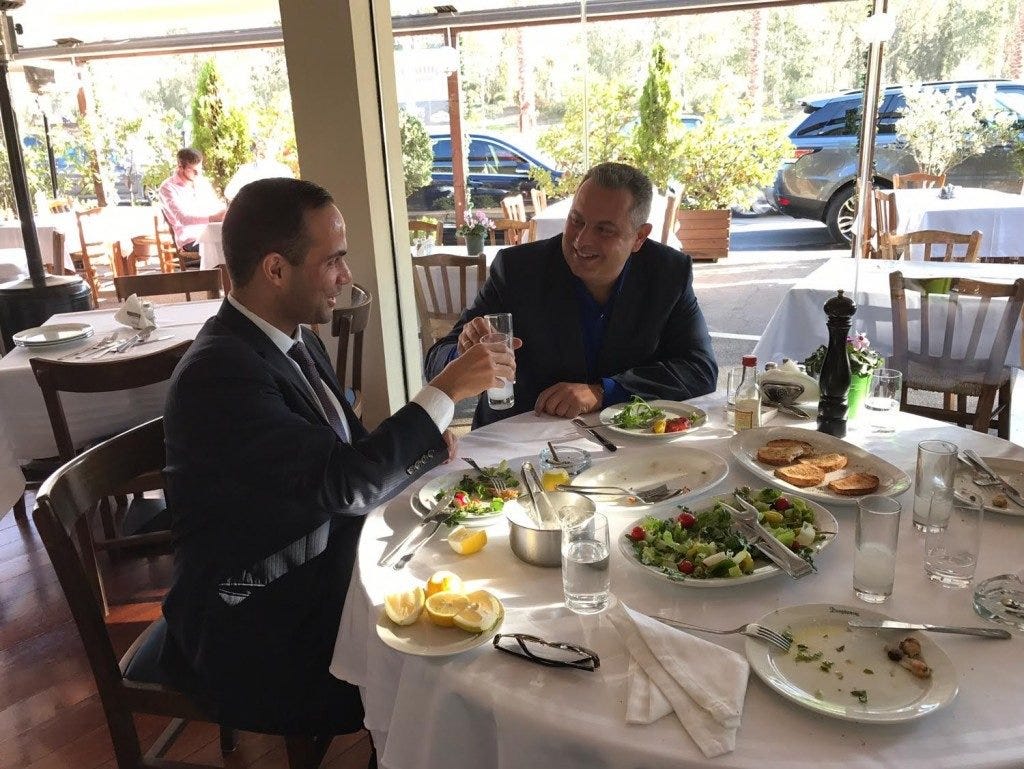
Kammenos, the only man in Greece who Papadopoulos met with numerous times, has ties to Russia’s Foreign Intelligence Service (SVR) and the Kremlin team that carried out the 2016 US Election interference campaign. He founded the Institute of Geopolitical Studies which, in 2014 signed a “memorandum of understanding” with the Russian Institute for Strategic Studies (RISS). A memorandum of understanding “expresses a convergence of will between [two] parties, indicating an intended common line of action.”
RISS was under the control of the SVR until 2009 when Putin decided it would be best to have it under his control at the President’s office. The RISS director until January 2017 was Leonid Reshetnikov, a man who is close to President Putin and regularly has meetings at the Kremlin.
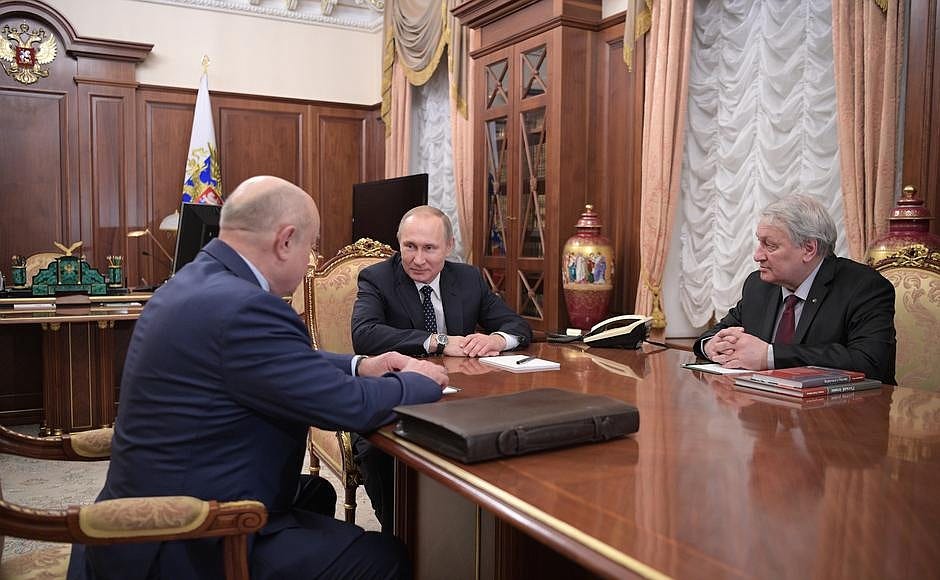
In hacked messages from an influential Russian blogger in 2014, he describesan encounter with Panos Kammenos:
“Panos appeared almost one month ago full of ‘enthusiasm,’ asking for regular cooperation. And then he went to Moscow for personal reasons, as he told us (for a friend’s wedding) and then disappeared from the face of the Earth in a quite impressive manner. I am very curious if I will ever know what reasons he will give for disappearing,” the message says.
One month later, the memorandum of understanding was signed with Reshetnikov. After this agreement, the official positions of Kammenos mimicked Kremlin talking points. In Moscow in March, 2015, Kammenos spoke of terminating Russian sanctions:
That wedding, the Wall Street Journal reported, was the result of an invitation from Russian businessman Konstantin Malofeev. Malofeev is barred from traveling to Europe or the United States because of allegations that he acted in support of the destabilization of Eastern Ukraine. Needless to say, he is strongly linked to the Kremlin. The Foreign Times summed it up by saying in 2015 that, “Nikos Kotzias, the foreign minister, and Panos Kammenos, defence minister, have both been cultivated by figures close to Russian president Vladimir Putin’s inner circle.” This was a year after Kammenos’s mysterious trip to Moscow.
In April 2017, Reuters reported that a Putin-linked think tank drew up plan to sway the 2016 US election, citing confidential documents. That Putin-linked think tank? Leonid Reshetnikov’s RISS. This Reshetnikov-Kammenos-Papadapoulos chain is a direct line of officials connecting the Kremlin’s US election interference and to the Trump team.
The Reuters report focused on two highly confidential RISS documents that US intelligence had received:
It recommended the Kremlin launch a propaganda campaign on social media and Russian state-backed global news outlets to encourage U.S. voters to elect a president who would take a softer line toward Russia than the administration of then-President Barack Obama, the seven officials said.
A second institute document, drafted in October and distributed in the same way, warned that Democratic presidential candidate Hillary Clinton was likely to win the election. For that reason, it argued, it was better for Russia to end its pro-Trump propaganda and instead intensify its messaging about voter fraud to undermine the U.S. electoral system’s legitimacy and damage Clinton’s reputation in an effort to undermine her presidency, the seven officials said.
On one of his first trips to Greece, Papadopolous also met with former Prime Minister Kostas Karamanlis. Karamanlis, in a surprising turn of events, was wiretapped by American officials because of his close ties to the Kremlin. The wiretaps also uncovered “an alleged plot to assassinate Karamanlis and found that there was evidence to suggest that persons unknown had targeted the premier because of his attempts to pursue closer relations with Russia.”
Wikileaks, which the US has deemed a hostile intelligence service helped by the Kremlin, published the intelligence cables. The Wikileaks reports state that the close ties between Greece and Russia “provoked action by the United States to avert agreements for Russian pipelines, leading to the gradual abandonment of the plans by Athens and its commitment to the Trans-Adriatic Pipeline (TAP), as well as the cancellation of plans to acquire Russian military equipment.” This cancellation likely cost Vladimir Putin’s Russia billions of dollars, leaving him with a deep-seated anger towards the United States. With these revelations in 2015, Putin set his sights on the upcoming US election.
Contact the Writer:
Twitter: @ScottMStedman

